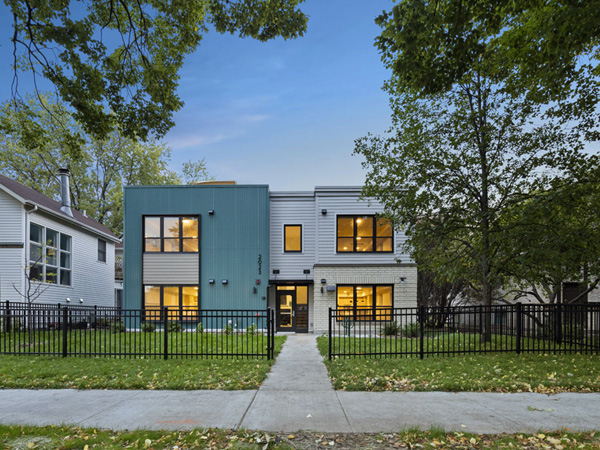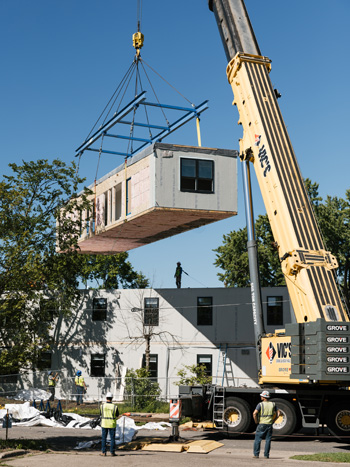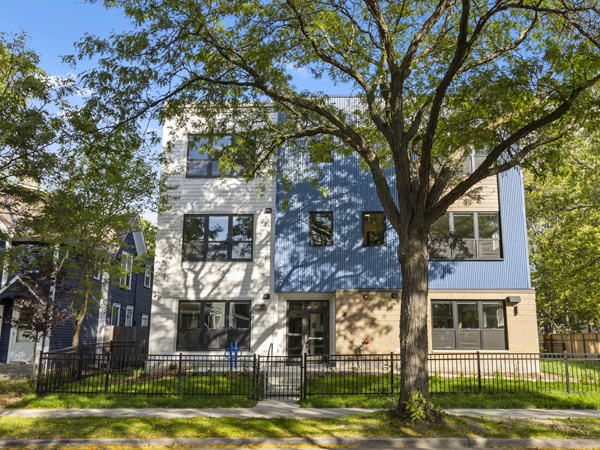Process and Construction Innovations Expand Affordable Multifamily Housing in Minneapolis
 Minneapolis' Family Housing Expansion Project consists of 84 new units of affordable housing developed on 16 sites scattered throughout the city. Scattered-site affordable housing allows lower-income families to access neighborhoods of opportunity throughout the city. Photo credit: Russell Heeter Photography
Minneapolis' Family Housing Expansion Project consists of 84 new units of affordable housing developed on 16 sites scattered throughout the city. Scattered-site affordable housing allows lower-income families to access neighborhoods of opportunity throughout the city. Photo credit: Russell Heeter Photography
In Minneapolis, Minnesota, modular construction is helping the city's public housing agency upgrade and expand its portfolio of affordable family housing, almost all of which consists of single-family and duplex structures scattered throughout the city. The Family Housing Expansion Project (FHEP) consists of 84 new units distributed across 16 sites. Each of the two- and three-story buildings at the sites has four to six units, gently adding density to each host residential neighborhood. In addition to demonstrating the cost- and time-saving advantages of modular construction, FHEP is notable for the innovative request for proposals (RFP) process that brought together the development team: general contractor Frerichs Construction, modular manufacturer Rise Modular (as a subcontractor to Frerichs), and DJR Architecture, all led by the Minneapolis Public Housing Authority (MPHA), which acts as the developer, owner, and property manager of the FHEP sites.
Project Details
All 84 FHEP units accommodate families; 26 units have two bedrooms and 58 units have three. Sixteen units are accessible to residents living with disabilities, and 17 are prioritized for households experiencing homelessness. Residents of the latter units have access to services funded through Hennepin County's Coordinated Entry System. All units rent to households earning no more than 30 percent of the area median income (AMI). The FHEP units represent a significant addition to MPHA's portfolio of more than 700 affordable family-sized homes.
 Using modular construction techniques allowed the developers to complete FHEP buildings more quickly, at a lower cost, and with less disruption to neighbors than comparable traditionally built structures. Photo credit: Russell Heeter Photography
Using modular construction techniques allowed the developers to complete FHEP buildings more quickly, at a lower cost, and with less disruption to neighbors than comparable traditionally built structures. Photo credit: Russell Heeter Photography
FHEP’s total cost was $49 million. Funding sources included 4 percent low-income housing tax credits, which generated $19.7 million in equity. HUD’s Section 18 disposition process enabled the conversion of the public housing sites to tax credit affordable housing properties. Additional funding sources included $1.4 million from the Metropolitan Council’s Local Housing Incentives Account (the Metropolitan Council is a regional planning agency, service provider, and policy body in the Twin Cities area), $4.6 million in funding from the American Rescue Plan Act of 2021, $1.2 million from the city’s Affordable Housing Trust Fund, and $500,000 from Hennepin County’s Affordable Housing Incentive Fund. In addition, the 16 buildings are partially powered by rooftop solar panels that provide approximately 30 percent of the project’s electricity. The solar panels were supported by $500,000 in equity generated from solar tax credits.
Advancing City Goals
FHEP, the largest new-unit project that MPHA has developed in more than 20 years, is helping the city achieve the affordable housing goals articulated in the Minneapolis 2040 Comprehensive Plan, adopted in 2019. MPHA’s strategic vision builds on this plan, calling for increasing density at the agency’s scattered-site properties to meet the city’s urgent need for affordable housing. Over the previous decade, the city had lost affordable housing units at a rate exceeding the rate of new unit production. In addition, housing that is affordable for Minneapolis’ lowest-income residents has become increasingly scarce; renter incomes in the city have declined 14 percent since 2000 while the median rent increased by 11 percent during the same period. As a result, Minneapolis decided to prioritize the creation of affordable housing for families earning no more than 30 to 50 percent of AMI as well as units with three or more bedrooms to house larger families.
Scattered-Site Advantages
"In Minneapolis, nearly all of the housing authority's portfolio of family-sized public housing units are scattered site. This can be a beneficial model for families," says Brian Schaffer, assistant director of real estate development at MPHA. "In part, this is because it offers residents access to established neighborhoods of opportunity throughout the city." Most of the sites selected for FHEP are close to transit, green space, and the city’s scenic trail system and were identified as needing upgrades. MPHA already owned 14 of the FHEP sites and purchased the remaining two sites specifically for the expansion project.
Modular Construction
The use of modular construction helped the development team overcome the challenges posed by undertaking FHEP's scattered, small-scale developments simultaneously. Modular construction allowed the developers to simplify the design process and respond to each building's neighborhood context, focusing on four-plex and six-plex variations of four core designs. Adopting a modular approach also meant that the FHEP approach cost 13 to 21 percent less than conventional construction. Because the FHEP buildings took less time to construct and required fewer deliveries of materials, the 96 households abutting the 16 sites and their nearby neighbors experienced much less disruption; Schaffer pointed out that FHEP was completed in approximately 14 months, fully wrapping up in December 2023, compared with the 18 months of construction time that a comparably sized tax-credit project built with conventional methods would have taken. Reducing project delivery times also reduces the accumulated interest on construction loans, further enhancing modular construction's cost advantage, particularly in the current environment of elevated interest rates. Schaffer estimated that the project saved hundreds of thousands of dollars thanks to this accelerated timeframe.
 Modular construction allowed developers to implement four core designs contextually at each site, gently densifying neighborhoods in accordance with the vision articulated in the city's Minneapolis 2040 Comprehensive Plan. Photo credit: Russell Heeter Photography
Modular construction allowed developers to implement four core designs contextually at each site, gently densifying neighborhoods in accordance with the vision articulated in the city's Minneapolis 2040 Comprehensive Plan. Photo credit: Russell Heeter Photography
Process Innovation
Despite the advantages of using modular construction, the number of sites nevertheless posed a logistical challenge that prospective developers would need to address at the project's outset. This need led to an unusual but effective RFP process. According to Schaffer, in the typical process, the major team members on a project — in this case, the architect, general contractor, and modular builder — would be evaluated and brought together independently under three separate RFPs. For FHEP, MPHA instead issued a single RFP stipulating that applicants must already have assembled a development team and planned how they would collaborate to complete work on the project's 16 sites. After the initial round, during which MPHA selected the three strongest bids, each of the teams were offered a $7,500 design stipend to develop their proposals. Design support grants, which typically are not available at this stage, allowed bidders to achieve the needed level of detail to ensure a smooth construction process, said Schaffer.
Schaffer noted that MPHA gained significant knowledge through this project and stressed the role of FHEP in catalyzing and sustaining affordable modular housing development in Minneapolis. Some smaller-scale projects similar in nature to FHEP currently are being explored, Schaffer reported. The FHEP model will allow MPHA to redevelop the roughly 600 additional scattered-site duplex and single-family units in its portfolio at significant cost and time savings.
Interview with Brian Schaffer, assistant director of real estate development, Minneapolis Public Housing Authority, 29 March 2024; Abbie Wilson. 2023. “Minneapolis Public Housing Authority Hits Major Milestone in 84-unit Family Housing Project,” news, 30 August. Accessed 16 April 2024; RISE Modular. n.d. “MPHA Family Housing Expansion.” Accessed 16 April 2024; Minneapolis Public Housing Authority. n.d. “Family Housing Expansion Project.” Accessed 16 April 2024; Correspondence with Drew Halunen, assistant director of administration, communications, and strategic partnerships, Minneapolis Public Housing Authority, 12 April 2024. ×
Minneapolis Public Housing Authority. n.d. “Family Housing Expansion Project.” Accessed 16 April 2024; Abbie Wilson. 2023. “Minneapolis Public Housing Authority Hits Major Milestone in 84-unit Family Housing Project,” news 30 August. Accessed 16 April 2024; Abbie Wilson. 2023. “Regional HUD Administrator, Mayor Frey, and Chair Fernando Join MPHA to Celebrate 16-Site, 84-Unit Modular Family Housing Grand Opening,” news, 26 September. Accessed 16 April 2024. ×
City of Minneapolis Department of Community Planning and Economic Development. 2022. “MPHA Family Housing Expansion Project: Housing Project Data Worksheet.” Accessed 16 April 2024; Interview with Brian Schaffer, assistant director of real estate development, Minneapolis Public Housing Authority, 29 March 2024; U.S. Department of Housing and Urban Development, Office of Public and Indian Housing. n.d. “Section 18 Demolition & Disposition.” Accessed 16 April 2024; Metropolitan Council. n.d. “Who We Are.” Accessed 16 April 2024; Abbie Wilson. 2023. “Regional HUD Administrator, Mayor Frey, and Chair Fernando Join MPHA to Celebrate 16-Site, 84-Unit Modular Family Housing Grand Opening,” news 26 September. Accessed 16 April 2024. ×
Abbie Wilson. 2023. “Regional HUD Administrator, Mayor Frey, and Chair Fernando Join MPHA to Celebrate 16-Site, 84-Unit Modular Family Housing Grand Opening,” news, 26 September. Accessed 16 April 2024; Interview with Brian Schaffer, assistant director of real estate development, Minneapolis Public Housing Authority, 29 March 2024; City of Minneapolis Department of Community Planning and Economic Development. 2019. “Minneapolis 2040.” Accessed 16 April 2024. ×
Correspondence with Drew Halunen, assistant director of administration, communications, and strategic partnerships, Minneapolis Public Housing Authority, 12 April 2024; Interview with Brian Schaffer, 29 March 2024; Abbie Wilson. 2023. “Minneapolis Public Housing Authority Hits Major Milestone in 84-unit Family Housing Project,” news, 30 August. Accessed 16 April 2024; DJR Architecture. n.d. “MPHA Family Housing Expansion.” Accessed 16 April 2024; City of Minneapolis Department of Community Planning and Economic Development. 2022. “MPHA Family Housing Expansion Project: Housing Project Data Worksheet,” Accessed 16 April 2024. ×
Interview with Brian Schaffer, 29 March 2024; RISE Modular. n.d. “MPHA Family Housing Expansion.” Accessed 16 April 2024; Minneapolis Public Housing Authority. n.d. “Family Housing Expansion Project.” Accessed 16 April 2024; Correspondence with Drew Halunen, assistant director of administration, communications, and strategic partnerships, Minneapolis Public Housing Authority, 12 April 2024. ×
Interview with Brian Schaffer, 29 March 2024; Correspondence with Drew Halunen, assistant director of administration, communications, and strategic partnerships, Minneapolis Public Housing Authority, 12 April 2024. ×
Interview with Brian Schaffer, 29 March 2024; Correspondence with Drew Halunen, assistant director of administration, communications, and strategic partnerships, Minneapolis Public Housing Authority, 12 April 2024. ×
Group interview with Mark Erwin; Nazarina Mwakasege; and Luke Hassevoort, director of mission impact of Ruth Ellis Center, 4 March 2024. ×
